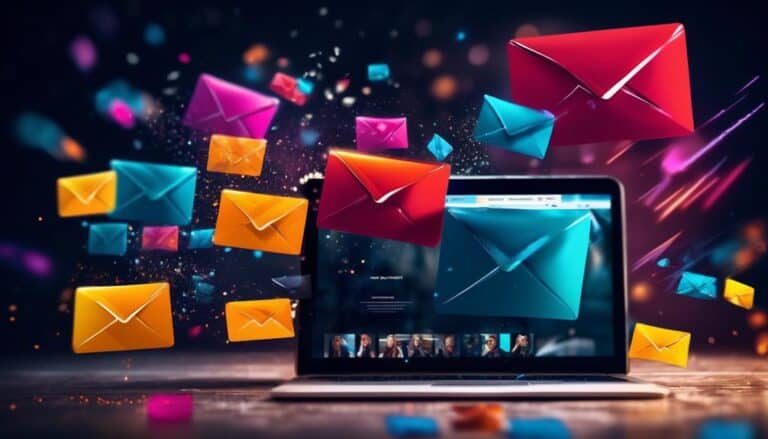Harnessing Emotion: How to Use Psychological Appeals in Your Email Subject Lines
Did you know that 47% of email recipients open an email based on the subject line alone? It's a staggering statistic that highlights the importance of crafting compelling subject lines that capture your audience's attention.
But how do you go about harnessing the power of emotion in your email subject lines? In this discussion, we will explore the various psychological appeals that can be used to make your emails stand out in a crowded inbox.
From fear and urgency to curiosity and intrigue, we'll delve into effective strategies that will leave your recipients wanting more.
So, if you're ready to take your email marketing game to the next level, keep reading to discover how to leverage psychological appeals in your subject lines.
Key Takeaways
- Emotional triggers in subject lines can evoke a sense of urgency or anticipation.
- Fear and urgency can be used to create subject lines that demand attention.
- Curiosity and intrigue can captivate the audience's attention and increase engagement.
- Building trust and connection through personalization and empathy is crucial in creating meaningful connections.
Understanding the Power of Emotion

Do you want to tap into the immense power of human emotion to create compelling and persuasive email subject lines? Understanding the impact of emotions and leveraging emotional triggers can make all the difference in capturing your audience's attention and driving them to open your emails.
Emotions play a significant role in decision-making and can influence actions and behaviors. By understanding the psychology behind emotions, you can strategically craft subject lines that resonate with your audience on a deeper level.
Emotional triggers are specific words or phrases that evoke strong emotional responses. These triggers can range from fear and urgency to excitement and curiosity. By incorporating these triggers into your subject lines, you can evoke a sense of urgency or anticipation, compelling your audience to take immediate action. For example, using words like 'limited time offer' or 'exclusive invitation' can create a sense of urgency and exclusivity, driving your readers to open your email right away.
The impact of emotions goes beyond just capturing attention. Emotionally-driven subject lines can also create a sense of connection and empathy with your audience. By understanding their pain points, desires, and aspirations, you can tailor your subject lines to resonate with their emotions. For instance, addressing their fears or offering solutions to their problems can create a sense of trust and reliability.
The Role of Fear and Urgency
Tap into the power of fear and urgency to create email subject lines that demand attention and compel your audience to take immediate action. Using scarcity tactics and leveraging social proof are effective ways to instill this sense of fear and urgency in your readers.
Scarcity tactics involve creating a sense of limited availability or a time-sensitive offer. By emphasizing that your product or service is in high demand or that time is running out to take advantage of a special offer, you tap into your audience's fear of missing out. Phrases like 'Limited Stock Available' or 'Last Chance to Save' can create a sense of urgency that motivates your audience to act quickly.
Leveraging social proof is another powerful way to create fear and urgency in your email subject lines. People tend to follow the crowd and feel a sense of urgency when they see others taking action. Including phrases that highlight the popularity or success of your product, such as 'Join Thousands of Satisfied Customers' or 'Don't Miss Out on What Everyone is Talking About,' can spark a fear of being left behind.
Tapping Into Curiosity and Intrigue

Unleash the power of curiosity and intrigue with email subject lines that captivate your audience's attention and leave them eager to uncover more.
By provoking anticipation and stimulating wonder, you can create a sense of excitement and make your recipients curious about what lies within your email.
One way to tap into curiosity is by using subject lines that hint at a fascinating secret or reveal a surprising fact. For example, 'Discover the untold story behind [insert topic]' or 'The shocking truth about [insert topic]'. These subject lines create a sense of intrigue and make your audience curious to know more.
Another effective strategy is to tease your audience with a subject line that promises valuable information or exclusive access. For instance, 'Unlock the secrets to [insert desired outcome]' or 'Be the first to get access to our new [insert product/service]'. By using these subject lines, you're provoking anticipation and stimulating wonder, which can increase open rates and engagement with your emails.
Remember to keep your subject lines concise and to the point, while still creating a sense of curiosity. Avoid using clickbait or misleading subject lines, as this can damage your credibility and trust with your audience. Instead, focus on delivering valuable content that lives up to the expectations you set in your subject lines.
Incorporating curiosity and intrigue into your email subject lines can pique your audience's interest and make them eager to find out more. By crafting subject lines that provoke anticipation and stimulate wonder, you can increase the chances of your emails being opened and your message being heard.
Creating a Sense of Exclusivity and FOMO
By offering exclusive access and fueling the fear of missing out, you can create a sense of urgency and desirability in your email subject lines. Generating anticipation and sparking desire are powerful tools to engage your audience and make them feel like they're part of something special.
Here's how you can use the psychology of exclusivity and FOMO to captivate your readers:
- Limited Time Offer: Create a sense of urgency by highlighting that your offer is available for a limited time only. Use phrases like 'Last chance,' 'Limited spots available,' or 'Ends soon' to encourage immediate action.
- VIP Access: Make your subscribers feel special by offering exclusive access to a new product, event, or content. Use subject lines like 'Exclusive invitation for our loyal customers' or 'Be the first to get access to our latest release' to make them feel privileged.
- Insider Deals: Offer special discounts or promotions exclusively for your subscribers. Use subject lines like 'Exclusive savings just for you' or 'Subscriber-only discount' to make them feel like they're part of an exclusive club.
- Sneak Peek: Give your subscribers a sneak peek into upcoming products, events, or content. Use subject lines like 'Get an exclusive preview of our new collection' or 'Be the first to see what's coming' to generate excitement and curiosity.
Building Trust and Connection

To establish a strong bond with your audience, cultivate trust and connection through your email subject lines. Building rapport and fostering empathy are key in creating meaningful connections with your subscribers.
When crafting your subject lines, consider using language that resonates with your audience and shows that you genuinely care about their needs and desires.
One effective way to build trust is by personalizing your subject lines. Addressing your subscribers by their first name can make them feel valued and acknowledged. For example, instead of a generic subject line like 'Check out our latest offers,' try something like 'Hey [Subscriber's Name], we've got something special for you!' This small tweak can make a big difference in establishing a personal connection.
Another strategy is to use subject lines that evoke emotions and tap into your subscribers' experiences. By empathizing with their challenges or aspirations, you show that you understand their journey and are there to support them. For instance, a subject line like 'Struggling to stay motivated? Let's help you stay on track!' not only acknowledges their struggle but also offers a solution, creating trust and connection.
Frequently Asked Questions
How Can I Measure the Effectiveness of Using Psychological Appeals in My Email Subject Lines?
To measure the effectiveness of using psychological appeals in your email subject lines, start by analyzing the response rate. Look at how many people open your emails and take action. This will help you gauge the impact of your approach.
Are There Any Ethical Considerations When Using Fear and Urgency in Email Subject Lines?
When using fear and urgency in your email subject lines, ethical considerations come into play. You must be mindful of privacy concerns and potential manipulation. A/B testing and tracking open rates can help measure effectiveness.
What Are Some Effective Strategies to Tap Into Curiosity and Intrigue in Email Subject Lines?
To tap into curiosity and intrigue in your email subject lines, create anticipation by using enticing language that engages your reader's interest. Craft subject lines that leave them wanting more, sparking their curiosity to open and explore your message.
How Can I Create a Sense of Exclusivity and FOMO (Fear of Missing Out) Without Alienating My Audience?
To create urgency and foster a sense of community without alienating your audience, you can use phrases like "limited time offer" and "exclusive access" in your subject lines. This makes them feel special and part of an exclusive group.
What Are Some Practical Ways to Build Trust and Connection Through Email Subject Lines?
Want to build trust and connection through email subject lines? Start by building rapport and establishing credibility. Craft subject lines that resonate with your audience, show empathy, and offer genuine value. Your readers will feel understood and compelled to open your emails.
Conclusion
In conclusion, by harnessing the power of emotion and using psychological appeals in your email subject lines, you can greatly increase the effectiveness of your email marketing campaigns.
Whether it's invoking fear and urgency, tapping into curiosity and intrigue, creating a sense of exclusivity and FOMO, or building trust and connection, these strategies can help you capture your audience's attention and drive them to take action.
So, don't underestimate the impact of psychological appeals in your email subject lines; they can be a game-changer for your marketing success.








